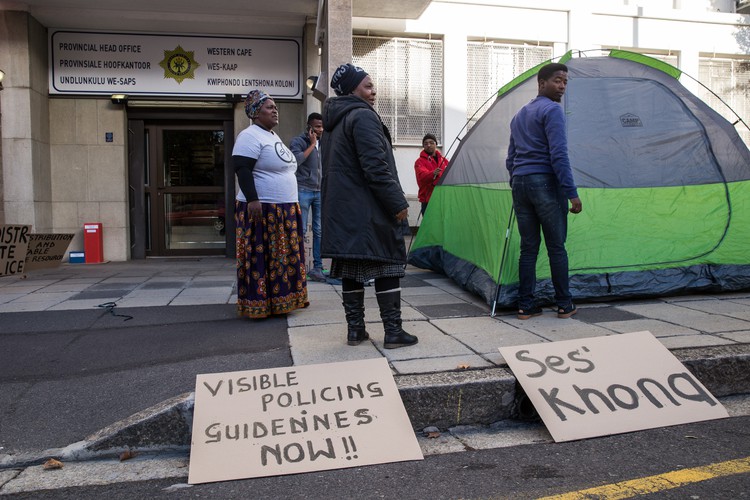Activists camp outside SAPS to demand more police in poor areas
Protest follows shooting of six officers and the death of mentally disabled man who had been in police custody
About 25 members and supporters of the Social Justice Coalition (SJC) camped on Wednesday night outside the SAPS Western Cape Provincial Head Office in Green Point, Cape Town. They demanded more police resources, lighting and policing guidelines for informal settlements.
“We want poor and black communities to be as protected as the area we are standing in,” said Axolile Notywala, General Secretary of the SJC. Notywala said they were demanding all those responsible for safety in the Western Cape to convene.
“They need to come with an urgent strategy because poor and black people are dying everyday in the Western Cape,” he said. Notywala said they have invited communities affected by high crime rates and murder to join the protest. This included people from Khayelitsha, Philippi and Hout Bay.
Some of the SJC demands are:
-
Policing guidelines for informal settlements
-
Reallocation of police to where they are needed
-
Strategy for intelligence-led policing
-
Adequate public lighting and CCTV cameras in poor communities
In December 2018, the Cape High Court ruled that the allocation of police in the Western Cape was discriminatory. The case has been appealed by SAPS and is ongoing.
Samora Machel in Nyanga recently witnessed a spate of violent crime. On Tuesday, Minister of Police Bheki Cele had a closed meeting in Samora Machel to discuss policing and crime within the community and the Western Cape. The very next morning, six Anti-Gang Unit (AGU) officers were shot and injured. Two of the officers were in critical condition.
The attacks on the AGU took place in Sweet Home Farm informal settlement in Samora Machel. A statement released by SAPS on the attack said that the area is difficult to monitor because the shacks are erected close together and that “the area is difficult to access with a terrain that is poorly lit”.
Notywala said that the lack of policing guidelines in townships is an issue that they have raised with SAPS. He said that the police are not trained for informal settlements and that there is not enough lighting. “It’s not only a risk to residents. It’s a risk to police officers as well,” he said.
Wednesday night’s protest follows another SJC-led one that took place on 28 May, when township residents marched through Rondebosch, a middle class suburb, demanding lighting.
Numvuyo Ntete, a resident from Town 2 in Khayelitsha, said that she joined Wednesday night’s protest because her neighbour’s son, Sipho Mpinda, was arrested on Thursday and found dead on Monday. Mpinda, who was mentally challenged, was arrested at Khayelitsha Mall. Residents have alleged that police beat him to death. The police claim that Mpinda escaped their custody and was subsequently killed in an “accidental homicide”.
When he was arrested, Mpinda had been trying to get into the car of a friend who drove him to the mall. Police assumed he was trying to break into the car.
On Tuesday residents demonstrated outside the Lingelethu West Police Station in Khayelitsha demanding that the police officer accused of beating Mpinda be arrested.
Ntete said that the police are unreliable. Even if something happens “they don’t come,” she said. She said that they must do what “they are employed for”.
By 5pm on Wednesday evening, an SJC branded marquee and two tents were set up outside the police station. Two portable toilets were also brought to the protest. Placards reading “redistribute police”, “effective public lighting” and “visible policing guidelines now!” were laid out around the police station. At one point, about 20 police officers were keeping watch.
Notywala said that they will stay outside the SAPS head office as long as they need to “because this is much safer than the area where we’re coming from”.
SAPS had not responded to request for comment by the time of publication. The protest continued on Thursday morning, and the tents remained standing.
Support independent journalism
Donate using Payfast

Don't miss out on the latest news
We respect your privacy, and promise we won't spam you.
Next: Aussie company show big profits from South African West Coast mine
Previous: After three generations, Kliptown shack dwellers are still using communal toilets
© 2019 GroundUp.
This article is licensed under a Creative Commons Attribution-NoDerivatives 4.0 International License.
You may republish this article, so long as you credit the authors and GroundUp, and do not change the text. Please include a link back to the original article.

